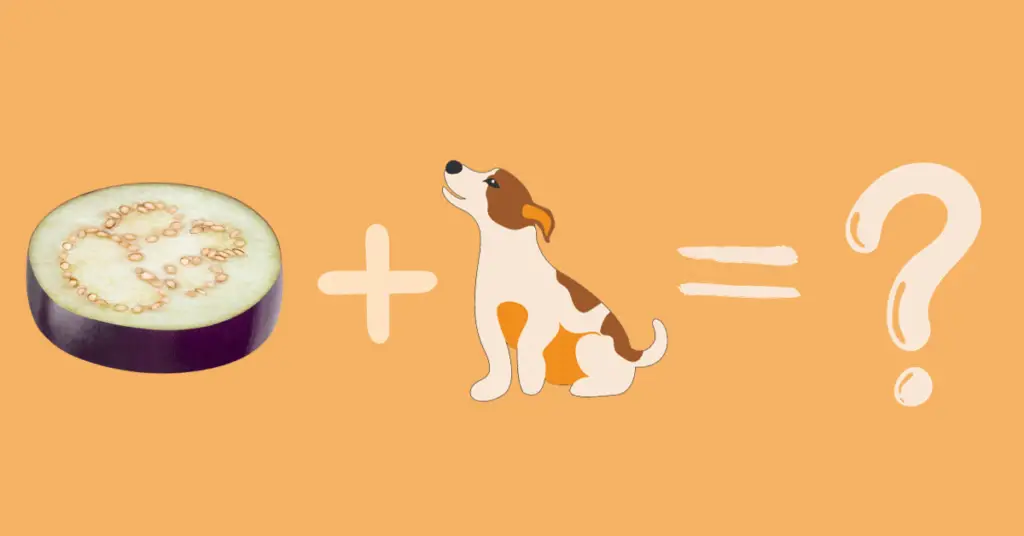
Curiosity about what’s safe and healthy for our dogs to eat is a top concern for pet owners. Eggplant, with its deep purple hue and unique taste, is a common vegetable in many households. But, can dogs eat eggplant seeds? Let’s dive into the details.
What is Eggplant?
Eggplant, also known as aubergine in some parts of the world, is a glossy, purple vegetable that belongs to the nightshade family. It’s widely used in various culinary dishes, especially in Mediterranean and Asian cuisines. From stir-fries to casseroles, eggplant is a versatile veggie that finds its way into numerous recipes.
Eggplant seeds are the tiny bits found inside the vegetable. They’re often part of the eggplant when we cook it, but can dogs eat eggplant seeds without any issues?
Can dogs eat eggplant seeds?
No, dogs should not eat eggplant seeds. Eggplant seeds, like those in many fruits and vegetables, can be challenging for dogs to digest. They are small and can pose a choking hazard, especially for smaller dog breeds. Moreover, the seeds can cause gastrointestinal issues and discomfort in dogs, potentially leading to vomiting or diarrhea. While eggplant flesh can be a safe treat for dogs in moderation, it’s best to avoid letting your furry friend consume the seeds to ensure their well-being and prevent any potential health risks. Always prioritize your dog’s safety by offering treats that are easily digestible and don’t present a choking hazard.
Understanding the Nutritional Value of Eggplant Seeds
Eggplant seeds, the tiny powerhouses within this popular vegetable, offer a variety of nutritional benefits. Although often overlooked, they can be a valuable addition to your diet. Can dogs eat eggplant seeds? Yes, but a veterinarian’s insight is key to making informed decisions regarding your dog’s diet and well-being. Here’s a closer look at the nutritional value of eggplant seeds:
| Nutrient | Amount per 100g |
| Calories | 27 |
| Protein | 1.18g |
| Total Fat | 0.99g |
| Saturated Fat | 0.19g |
| Monounsaturated Fat | 0.72g |
| Polyunsaturated Fat | 0.06g |
| Carbohydrates | 5.6g |
| Fiber | 3.3g |
| Sugars | 1.32g |
| Calcium | 14mg |
| Iron | 2.21mg |
| Magnesium | 66mg |
| Phosphorus | 97mg |
| Potassium | 738mg |
| Sodium | 2mg |
| Zinc | 1.04mg |
Benefits of Eggplant Seeds for Dogs
- Nutritional Value: Eggplant seeds are a source of various nutrients like vitamins, minerals, and fiber. They contain essential minerals such as potassium, magnesium, and phosphorus that contribute to overall health.
- Fiber Content: The seeds have a good amount of fiber which can aid in digestion and help with bowel movements, promoting a healthy digestive system.
- Antioxidants: Like the flesh of the eggplant, the seeds contain antioxidants that can help combat free radicals in your dog’s body and contribute to their overall well-being.
- Weight Management: As eggplant seeds are low in calories and high in fiber, they can be a part of a balanced diet, potentially aiding in weight management for overweight dogs.
- Vitamins: Eggplant seeds contain vitamins like vitamin K, which is essential for blood clotting and bone health.
Risks and Considerations
- Digestive Issues: The seeds can be difficult to digest, especially for dogs with sensitive stomachs. They might experience gastrointestinal discomfort, including vomiting or diarrhea.
- Choking Hazard: The small size of the seeds can pose a choking hazard, particularly for smaller dog breeds or dogs that tend to eat without much chewing.
- Potential Allergic Reactions: Some dogs may have allergies to certain components in eggplant seeds, leading to allergic reactions. Always monitor your dog for signs of allergies like itching, swelling, or difficulty breathing.
- Quantity and Moderation: Like any treat or new food, moderation is essential. Too many seeds can overwhelm your dog’s digestive system and potentially lead to digestive upset.
- Preparation Matters: How the seeds are prepared matters. Raw seeds are more likely to cause digestive issues compared to cooked ones. Always ensure the seeds are cooked and free from any harmful seasoning or additives.
Is eggplant skin safe for dogs?
Yes, eggplant skin is generally safe for dogs. However, there are conditions and considerations. When prepared properly, cooked, and offered in small, manageable portions, eggplant skin should pose no harm to your dog. Nonetheless, always be cautious and monitor your dog after introducing any new food, including eggplant skin. Some dogs might have sensitivities or allergies to certain components of the skin.
Can dogs eat eggplant?

You might be eager to know the answer to the question: can dogs eat eggplant? Yes, dogs can indeed eat eggplant. However, there are some considerations to keep in mind to ensure it’s safe and beneficial for them.
Eggplant is a nutrient-dense vegetable. It provides essential vitamins and minerals such as vitamin K, vitamin C, vitamin B6, potassium, and manganese. These nutrients play crucial roles in a dog’s health, aiding in blood clotting, immune function, and more.
FAQ
Are Eggplant Plants Toxic to Dogs?
Yes, eggplant plants can be toxic to dogs. The plant, including its leaves, stems, and flowers, contains a substance called solanine, which can be harmful to dogs if ingested in large quantities. Solanine is a glycoalkaloid and can cause gastrointestinal issues, including vomiting, diarrhea, and abdominal discomfort. It’s essential to keep your dog away from eggplant plants to avoid potential poisoning.
Is it Safe to Eat Eggplant Seeds?
Yes, it is generally safe for humans to eat eggplant seeds. However, when it comes to dogs, it’s advisable to avoid feeding them eggplant seeds. The seeds can be difficult for dogs to digest and may cause gastrointestinal discomfort or blockages. It’s better to err on the side of caution and not let your dog consume eggplant seeds.
What if My Dog Accidentally Ate Eggplant?
If your dog accidentally consumes a small amount of eggplant, it’s likely they’ll be fine, especially if the eggplant was cooked and not heavily seasoned. However, keep an eye on your dog for any signs of digestive issues such as vomiting, diarrhea, or unusual behavior. If you notice any concerning symptoms or if your dog ate a large amount of eggplant, contact your veterinarian for guidance and to ensure the ingestion won’t have any adverse effects on your dog’s health.
Final words
In conclusion, can dogs eat eggplant seeds? Yes, dogs can enjoy eggplant seeds in moderation as part of their diet. However, it’s crucial to approach this treat with caution and responsibility. Before introducing any new food, including eggplant seeds, into your dog’s diet, seek guidance from your veterinarian. While they can, it’s always better to have professional advice to ensure that it aligns with your dog’s specific health requirements and dietary needs. Your veterinarian can provide recommendations on the appropriate portion sizes and frequency to maintain a balanced and nutritious diet for your furry companion, ultimately fostering a happy and healthy canine friend.
